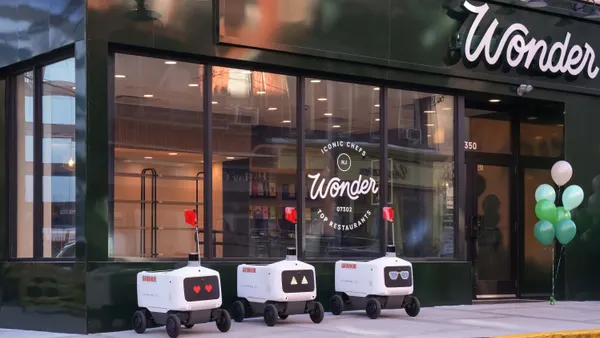Dive Brief:
- Uber Eats and DoorDash reportedly discussed combining operations around six months ago under pressure from their mutual investor SoftBank, according to the Financial Times.
- The talks fell apart, but sources told the Financial Times that the two companies could negotiate again in the future or merge with a rival company. DoorDash reportedly wasn’t big on a merger because it felt it had better growth prospects than Uber Eats.
- Uber Eats told Restaurant Dive it doesn't comment on rumors or speculation, but would consider potential deals that work best for the company, shareholders and the markets. It reiterated its focus on being No. 1 or 2 in the markets where it operates, and it is already second in the U.S. DoorDash declined to comment.
Dive Insight:
While consolidation among top providers has long been speculated — at one point DoorDash and Postmates were rumored to discuss a merger in 2018 — many analysts are taking a when, not if attitude over consolidation, especially since the segment has struggled with profitability.
"There are multiple platforms and parties out there that are thinking through strategic M&A to increase and diversify their services as well as to grow scale," Josh Benn, managing director and global head of consumer, food, restaurant and retail M&A at Duff & Phelps, told Restaurant Dive. That includes many of the tech and service providers working alongside delivery providers, he said. This will lead to more scale and diversity, with larger players offering broader breadths of services and better pricing models, he said.
If a big delivery player were to ever merge into another, it would mean the removal of a large competitor in the space, Michael Schaefer, global lead, food and beverage at Euromonitor International, told Restaurant Dive in an email.
"This would mean less need for discounts to win new customers and maintain current ones, and it would also reduce competition for drivers and potentially mean less bargaining power for restaurants," he said. "So it could drive profitability, a major area of focus for every company in this space."
On the other hand, there would likely be more regulatory scrutiny considering how much of an impact the segment has on the restaurant industry and how many couriers it employs, Schaefer said.
And consolidation is already happening among providers, especially Uber Eats and DoorDash. Uber Eats sold its India business to Zomato after it was unable to gain dominance in the country. It also offloaded its South Korea business. DoorDash has become an active acquirer, buying Caviar, which focuses on premium restaurants, and Scotty Labs, a startup that develops autonomous and remote-controlled vehicle technology, last year.
Grubhub was rumored to be considering a sale, but the company later said that wasn't true. It does, however, expect there to be strategic opportunities to acquire, which it has done in the past with LevelUp and Tapingo in 2018. Postmates faced similar reports that it was looking to sell itself that it had to dispel.
"[It] remains to be seen how mergers fit into delivery aggregators' company culture, much of which has been centered on growth at all costs, but it's also an inevitability at this point, given market dynamics and investor sentiment," Schaefer said.











